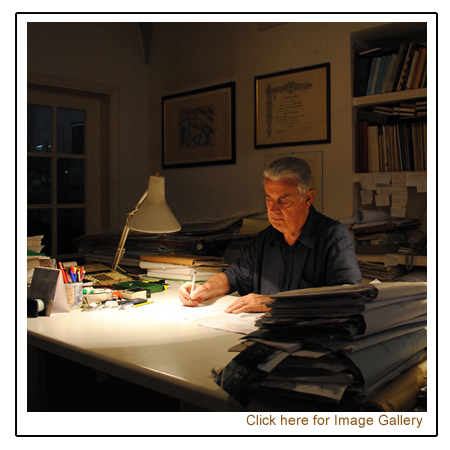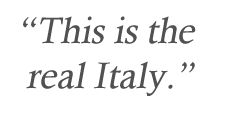Romano Romanini: A Man About Cagli
story and photos by Vanessa Dunham
Romano Romanini smiles as he sucks in a breath of fresh, mountain air. Before he exhales, he pauses to savor it. “This is the life,” Romanini says, gesturing to the cobblestone streets and tiled, pointed rooftops of the ancient town he calls home. “This is the real Italy.”

His gaze sweeps over Cagli’s bustling piazza -- the town’s gathering place that teems with life. Sounds fill the square as children enjoy cones of gelato, young men whiz by on motterinis, and clusters of people converse over a glass of wine or shot of espresso. Romanini takes it in with bright, hazel eyes that shift from brown to limestone green.
Romanini plans to celebrate the end of his workday with gelato from Caffé D’Italia, where he met his wife more than 40 years ago. Romanini and his wife have since raised their two sons, Guido and Simone, in the town Romanini still calls home.
As Romanini makes his way to the café, he pauses to greet familiar faces with a friendly “ciao” or “buona sera.” “In Cagli, everybody knows Romano, and Romano knows everybody,” Romanini says. Although he was not born in Cagli, this is definitely Romano’s town.
Life Before Cagli
Romanini was born in Pescara, in the southern region of Abruzzi. His father worked for an insurance company until becoming an army captain. When his father left to serve in World War II, Romanini’s family moved north to Le Marche to live with his grandparents. He was young, but he remembers the war well. Romanini says vivid memories “play like a film in his head.”
Romanini’s eyes narrow into slits as he recalls a particular scene. When he was six years old, he saw German soldiers shoot one of his friends from a military plane flying overhead. Romanini closes his eyes and drops his chin to his chest. He slowly shakes his head and whispers “terribile” over and over again. He shakes off the memory and returns his focus on his current surroundings.
“Here, life is good,” Romanini says. “I have everything I need. My wife, my house, my family and my geology.”
Before he finished high school, Romanini knew he wanted to be a geologist. He says that at the time, it was tough to make money in the field, but he was in love with nature so it was worth it. After earning a doctorate in Bologna, Romanini and his friend started the first geologic business in Le Marche. At the time, he lived in Pesaro, a beach town that stretches along the Adriatic Sea.
Romanini says the Italian geology industry started to boom in the 1960s. He traveled the region working with miners and engineers. There was no competition, so the duo took home loads of lira. One day, Romanini says, his partner withdrew millions of lira from their joint bank account and left town. Romanini’s livelihood was gone in an instant. He needed a new job. He eventually found a position teaching math in Cagli, about 60 kilometers west of Pesaro. Romanini has been enjoying the tranquil town ever since.
New Roots; Old Town
Cagli is nestled in the emerald slopes of the Apennine Mountains. Romanini’s first home in Cagli was a tiny, dark, dusty room with an old, iron-framed bed. He rented the room in 1963. Now, Romanini lives in the Bonclerici House, a sprawling, seventeenth century palazzo boasting the largest garden in Cagli. Romanini raises his eyebrows and explains that some of the garden’s fruit trees are hundreds of years old. His wife, Tilde, tends to the sprawling garden that includes lemon, apple, fig and cherry trees, alongside flowers with purple and red blo ssoms. Two of Romanini’s cats, Roscetta and Baffino, bask in the sun while their two feline friends, Arrugginita and Chicco, relax on the coolness of the stone palazzo. ssoms. Two of Romanini’s cats, Roscetta and Baffino, bask in the sun while their two feline friends, Arrugginita and Chicco, relax on the coolness of the stone palazzo.
After teaching for 20 years, Romanini returned to geology. He started his own business, which mostly conducts seismic and foundational studies for new construction in Le Marche. His office and workshop are tucked away in a corner of the palazzo, between the garden and cobblestone street. Romanini and his wife also run four vacation rentals in Cagli and welcome guests from around the world.
In between work, Romanini meets with friends in the piazza, walks to the store to pick up the day’s paper, and takes time for leisurely naps after meals with his family. According to Romanini, the Cagliese know what it means to enjoy a slower, richer life. “I’m always busy, and I’m always free,” Romanini said. “That is life in Cagli.”
|